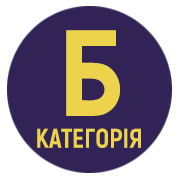PROFESSIONAL TRAINING OF FUTURE EDUCATORS OF PRESCHOOL EDUCATIONAL INSTITUTIONS IN THE CONTEXT OF IDEAS OF THE HUMANISTIC EDUCATIONAL PARADIGM
DOI:
https://doi.org/10.32782/ped-uzhnu/2024-4-14Keywords:
humanistic educational paradigm, educational process, professional training, professional competence, future educators, preschool educational institutionAbstract
The author of the article has revealed the essence of the humanistic educational paradigm, which is an important component of the professional training of future educators of preschool educational institutions, which provides the primary attention to the psychological state of applicants for higher education, care for creating conditions for the comprehensive development of the individual, which will promote self-improvement and development of critical thinking. We have considered the views of scientists on the problem of humanization of educational training of future educators, formation and development of the future educator's personality, formation of his/her professional competence for the implementation of future effective professional activity in modern preschool educational institutions, formation of cognitive independence, readiness for prognostic activity and innovative pedagogical activity, formation of professional and ethical competence and professional culture of future educators. The priorities of humanistic education, principles and ways of their implementation have been highlighted, in particular: the most independent learning of students, connection with the life and interests of students, the usages of educational experience, lifelong learning. The structured training of future educators as an integral part of culture and education, the basic foundations for the formation of educational, organizational, reflective, and communicative skills that contribute to the formation of pedagogical culture and skills of future educators have been determined. We have also analyzed the methodological provisions of the humanistic paradigm in the process of training future specialists, which include: taking into account the uniqueness of the individual, adapted approaches for a particular applicant and a particular educational situation; active participation in the educational process, evaluation and self-assessment of the results obtained in the process of collaborative design of the educational process, creation of curricula, choice of primary disciplines; the usage of individual capabilities in achieving the goals of training future educators of preschool educational institutions; meaningful interpersonal communication between teachers and future specialists to achieve common goals; teachers' provision of conditions that will help applicants to learn to use the acquired knowledge, their intelligence, emotions, intuition to solve problems, make decisions or cognition of the world, to form professional competencies and readiness to work in a preschool educational institution.
References
Атрощенко Т. О., Попович О. М. Характеристика фахової компетентності як індикатора професійного становлення майбутніх вихователів закладів дошкільної освіти. Актуальні проблеми навчання і виховання в умовах інтеграційних процесів в освітньому та науковому просторі : зб. тез доповідей V всеукр. наук.- практ. Інтернет-конф. (Мукачево, 4 лист. 2022 р.). Мукачево : МДУ, 2022. С. 97–101.
Бєлєнька Г. В. Формування професійної компетентності сучасного вихователя дошкільного навчального закладу: [моногр.]. Київ: Університет, 2011. 320 с.
Бєлєнька Г. В. Підготовка вихователів дітей дошкільного віку: вектор євроінтеграції. Педагогічна освіта: теорія і практика. Психологія. Педагогіка. 2021. № 35 (1). С. 30–35.
Кадемія М. Ю. Інформаційно-комунікаційні технології навчання: словник термінів. Львів : СПОЛОМ, 2009. 260 с.
Машовець М. А. Підготовка сучасного педагога дітей дошкільного віку в умовах мінливого соціуму. Педагогічні науки: теорія, історія, інноваційні технології. 2015. № 4(48). С. 339–347.
Поліщук О.М. Ресурси саморозвитку особистості. Психологія саморозвитку особистості: збірник наукових праць. Чернівці – Київ, 2016. 284 с.
Попович Оксана Теоретико-методологічні засади формування соціальної компетентності майбутніх вихователів закладів дошкільної освіти в умовах сучасних викликів. Молодь і ринок : щомісячний науково-педагогічний журнал. Дрогобич, 2024. № 3(223). С. 41–45.
Rogers C. R. Freedom to Learn by Freiberg. H. Jerome. [1994, 3rd Edition.]. 406 p.







